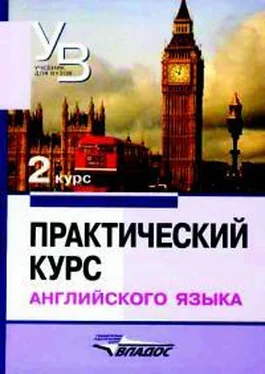— I'd like you to tell me something about your country.
— I think the best way to get a general idea of a country is to study the map. It's lucky I've
got one with me. Here it is.
66 hedge:a row of bushes or low trees which are forming a kind of barrier.
— Perhaps we had better start with the physical outline of the country.
— Well, Russia can be divided roughly into two main regions — the highlands in the east
and the lowlands covering the greater part of the country, with a long mountain range cutting it into
two unequal parts.
— You mean the Urals. They form the natural border between Europe and Asia. But the
highest mountain chains, as far as I can see are situated in the south and the south-east of the country.
What do you call them?
— The Caucasus, between the Caspian and the Black Sea and the Altai in Asia.
— I'd love to go there. My hobby is mountaineering. But our mountains are not so high as
yours, as far as I know.
— I believe they are not We have peaks four and a half miles high. But we also have
lowlands several hundred feet below sea level. We have steppes in the south, plains and forests in the
midlands, tundra and taiga in the north.
— What are the "steppes"?
— They are treeless plains covered with grass. The soil is fertile there.
— And is the tundra like our heather moors?
— Not in the least. It's a kind of frozen desert in the Arctic region.
— And what is the 'taiga', I wonder?
— It's a thick coniferous forest stretching to the south of the tundra. It's rich in animals,
valued for their fur like sable, fox, squirrel.
— I'd like to go hunting there, but I'm afraid I would never be able to stand toe cold.
— Our climate is also varied. In the south-west the weather is usually mild and wet; northern
Asia is one of the coldest places on earth, and in the south the heat is unbearable. But in the middle
of the country the climate is moderate and continental.
— Well, it has been very interesting for me to hear all those things. Thank you very much for
your information.
Memory Work
England! with all thy faults, I love thee still,
I said at Calais, and have not forgot it
I like the taxes when they're not too many;
I like a sea-coal fire, when not too dear;
I like a beef-steak, too, as well as any;
Have no objection to a pot of beer;
I like the weather when it is not rainy,
That is, I like two months of every year.
George Byron
ESSENTIAL VOCABULARY (П)
Words
border n
hedge n , υ
resort n
cattle n
level n
rural adj
chemicals n
machinery
n
steppe n
cotton n
moderate adj
stretch υ,
n
desert n
pasture n
taiga n
dock n
peak n
tool n
fence n
picturesque adj
tundra n
fertile adj
range n
vast adj
financial adj
raw adj
Word Combinations
information technology
densely (thinly) populated
consumer
electronics
shipbuilding yards
highly developed
trading centre
coal (iron) fields
rural district
offshore
oil
industry
rich in (smth.)
heavy (light) engineering
moderate (mild)
climate
Proper Names
the Avon
Dublin
the North Sea
Belfast
Eire
the Pennines
Birmingham
Glasgow
Portsmouth
the Bristol Channel
the Grampians
the Severn
the Cambrians
the Hebrides
Sheffield
the Cheviot Hills
the Orkney Islands
Southampton
the Clyde
the Shetland Islands
the Strait of Dover
the Cumbrians
Ireland
the Tyne
Leeds
the Thames
Manchester
the Mersey
Newcastle
EXERCISES
I. Study Texts A and В and a) transcribe the words below:
petrochemicals, commerce, fertile, engineering, iron, industry, equipment, moderate, resort,
pharmaceuticals, dairying, rear, rural, picturesque, meadow, ploughing, acre.
b) Transcribe the geographical names used in Text A,
II, Pick out front Text A English equivalents of the following:
высокоразвитая промышленная страна, ведущий финансовый центр, тяжелое
машиностроение, каменноугольный бассейн, электронное оборудование, судостроительные
верфи, ускоряющийся темп перемен, разработки в высокотехнологичном производстве,
добыча нефти в открытом море, информационная технология, бытовая электроника, страна с
высокой плотностью населения, земледелие, химические продукты из нефтяного сырья,
сельскохозяйственный район, плодородные долины, хорошо возделанные поля, живописный
пейзаж, мягкий климат, модные курорты.
III. Writte questions about Text A, using the words and phrases from Ex. II.
Prepare to discuss the text (Use he map.)
IV. Read Text С and pick-out English squivalents of the following phrases:
получить общее представление о чём- n ., иметь при себе что-л., образовывать
естественную границу, насколько я понимаю, мое любимое занятие (мой конек), насколько
мне известно, ниже уровня моря, ни в коей мере, непереносимый.
V. Retell Text С in indirect speech. Try and give an additional piece of
information on the topic.
VI. Fill in Use weirds bolder, boundary or frontier. Choose the correct
alternative.
Note:The Russian word граница has several equivalents in English: border — пограничная
зона или полоса по обе стороны демаркационной линии, е.g. The people living on the border of
two adjoining countries usually speak the languages of both.; boundary — граница как
разграничительная линия, предел, е.g. This stream forms a boundary between the two farms.;
frontier — граница как демаркационная линия, государственная граница, е. д, to pass the
frontiers, и как пограничная зона или район (в отличие от border) только по одну сторону
демаркационной линии, е.g. to guard the frontiers, frontier station, fortress, incident, dispute,
1. When we went camping, we put up our tents on the ... of the lake. 2. The ... incident was
Читать дальше





![Владимир Аракин - Практический курс английского языка 3 курс [calibre 2.43.0]](/books/402486/vladimir-arakin-prakticheskij-kurs-anglijskogo-yazyk-thumb.webp)






